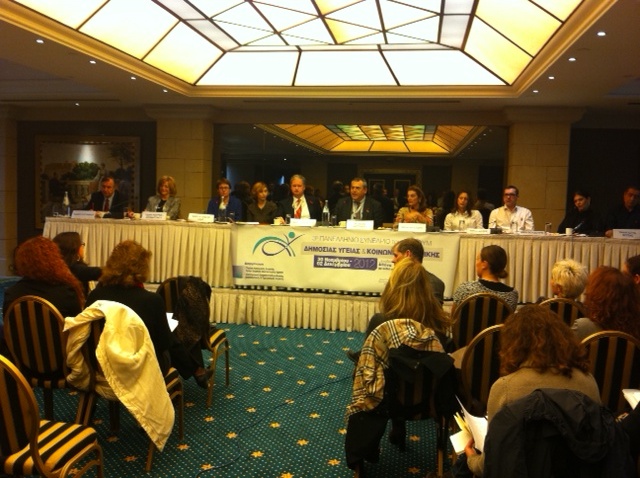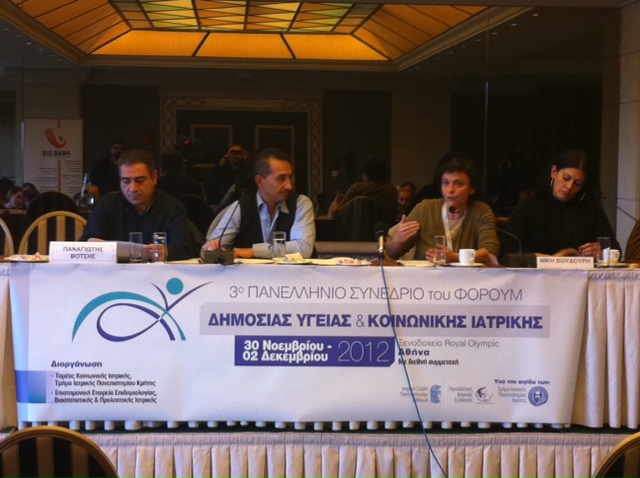Anastasia Balezdrova
A sharp and continuous increase in the number of new cases of infection with HIV over the last three years has been reported by the health services in Greece, the data for people who take the drugs intravenously being the most dramatic. While in the period 2008 - 2010 their number was between 10 and 14 per year, 206 cases were registered in 2011 and 487 by October 2012.
1,049 new cases have been registered since the beginning of the year up to October. After drug addicts, the highest is the number of the so-called MSM or men who have sex with men - 256 people. 108 said they had heterosexual contacts and 198 did not indicate how they had been infected.
The data were presented at the conference on "The AIDS virus in crisis Greece." According to the Hellenic Centre for Diseases Control and Prevention, 1,049 new cases have been registered since the beginning of the year up to October. After drug addicts, the highest is the number of the so-called MSM or men who have sex with men - 256 people. 108 said they had heterosexual contacts and 198 did not indicate how they had been infected.
As the professor of epidemiology and prevention at the Medical School of Athens University Angelos Hatzakis says, the epidemic among drug addicts in Athens, who take the drugs intravenously, is the fastest growing epidemic in Europe.
For the time being, it is limited within the Greek capital, where according to data, the number of drug addicts is around 8,000 and 3,000 of them take the drugs intravenously. "For three months, we carried out a study within the frameworks of the "Aristotle" programme and spoke to 1,400 drug addicts. At least once a day, 54% take the drugs intravenously, 30% - not every day but more than once a month and the remaining 16% - once a month or rarely. Over the past year, 11% of them have used an already used syringe at least for half of the injections, 29% - rarely and 60% - never," said Vana Sipsa, a lecturer at the Medical School.

"What made a great impact on us was that the majority of these people were homeless and in need of additional support. It is not possible to heal someone for a number of days and then let him or her live on the street again. This stops the solving of the problem," said Angelos Hatzakis and presented successful examples of dealing with this problem. "In New York, they managed to reduce the number of new infections with HIV by 95% but they applied a comprehensive method to solve the problem."
Coordination is needed to expand the programme providing syringes and needles in Athens. If that does not happen, the transmission from people using common syringes is very likely to increase and accelerate, thus affecting a lot of people and for a long period of time. The cost of prevention to avoid the spread of HIV is far lower than the cost of treatment of HIV positive.
According to the director of the European Centre for Disease Prevention and Control, Mark Sprenger, Greek health authorities have triggered the mechanisms to deal with the boom of infections among drug addicts. "But given the scale of the cases, I would say that coordination is needed to expand the programme providing syringes and needles in Athens. If that does not happen, the transmission from people using common syringes is very likely to increase and accelerate, thus affecting a lot of people and for a long period of time. The cost of prevention to avoid the spread of HIV is far lower than the cost of treatment of HIV positive."
The head of the organization against drugs Meni Maliori said that negotiations were underway between organizations and municipalities for the development of new centres where drug addicts could be involved in treatment programmes with methadone. They are also discussing the establishment of points, which will supply them with new syringes for free in order to avoid the risk of being infected with HIV.
"The problem is very serious. New types of drugs have appeared that are taken in different ways. Some of them increase sexual desire, creating new opportunities for the spread of the virus," she said.
Representatives of the non-government organizations Praxis, "Centre for Life" and "Positive voice" warn that because of the crisis, many HIV positive are losing their jobs and their health insurance along with it and put at risk their treatment. Others are losing their social benefits to which they were entitled and remain without any means.

They strongly criticized the police and the Ministry of Civil Defence in the case of HIV positive prostitutes a few months ago. "We saw then how our long-term efforts against stigmatization were wasted. The women were presented as prostitutes although it was quite clear that they were doing this to ensure their daily dose. The authorities revealed their names and the families of some of them were threatened with beatings in the neighbourhoods where they live."
The participants in the press conference agree that the absence of sex education classes in schools is a serious gap in the fight against the spread of HIV. "Textbooks were written and printed, which then sank into some warehouses. They never reached the schools. The reason for this was some of the parents and the Church to a large extent," said the director of the Hellenic Centre for Diseases Control and Prevention Tzeni Kremastinou. She has pointed out that separate programmes to inform the students are being held and emphasized that social networking is the easiest way to alert them to the dangers of HIV.